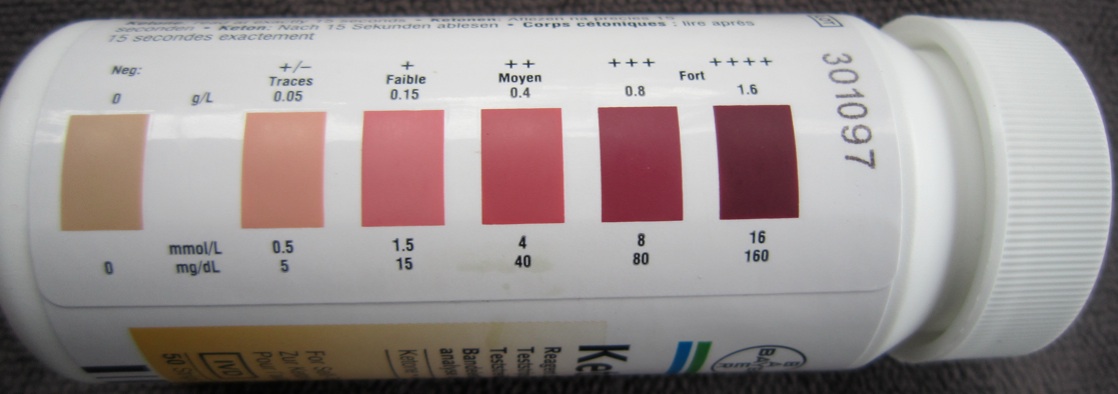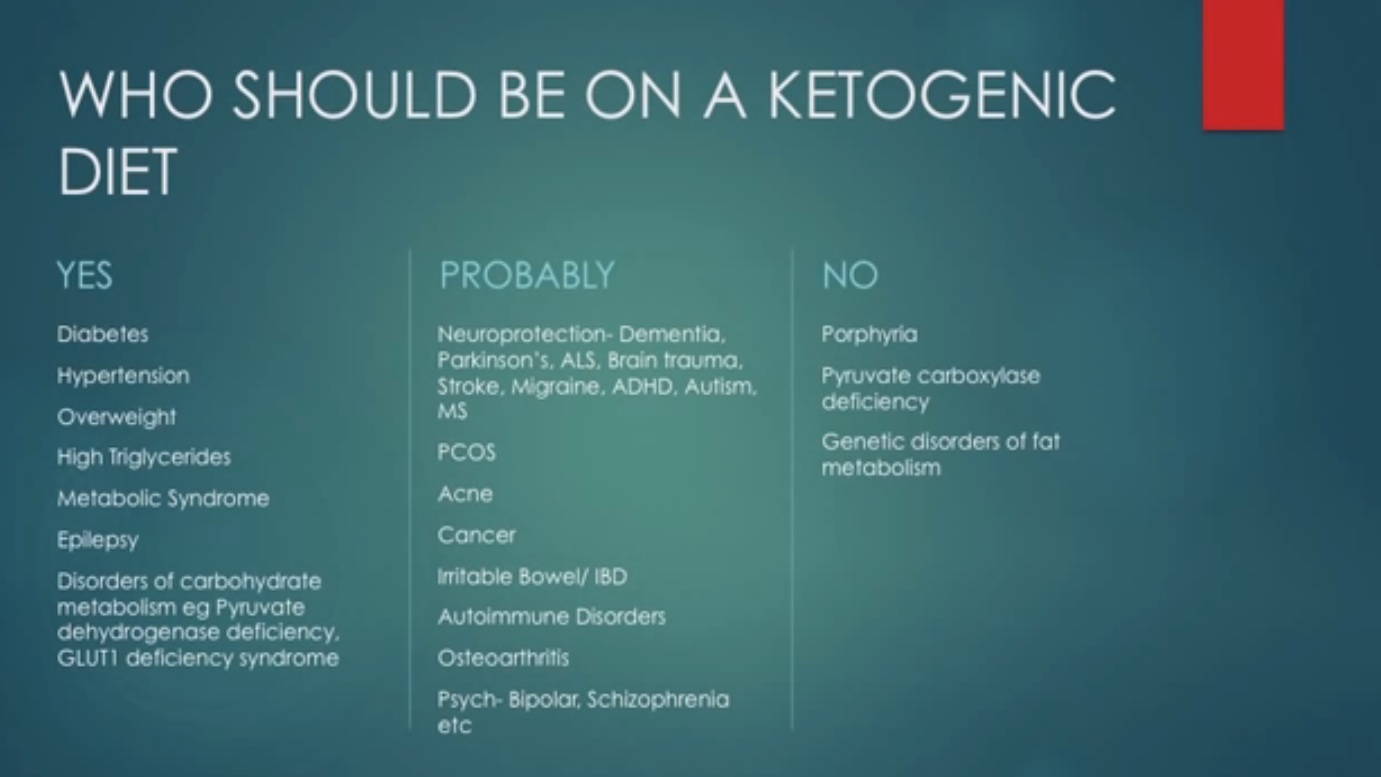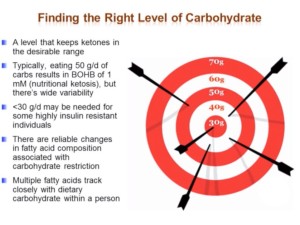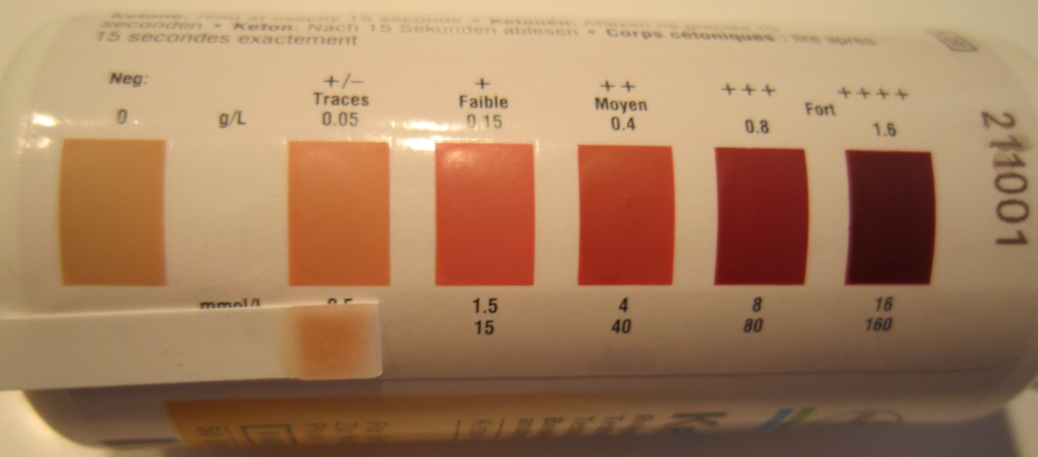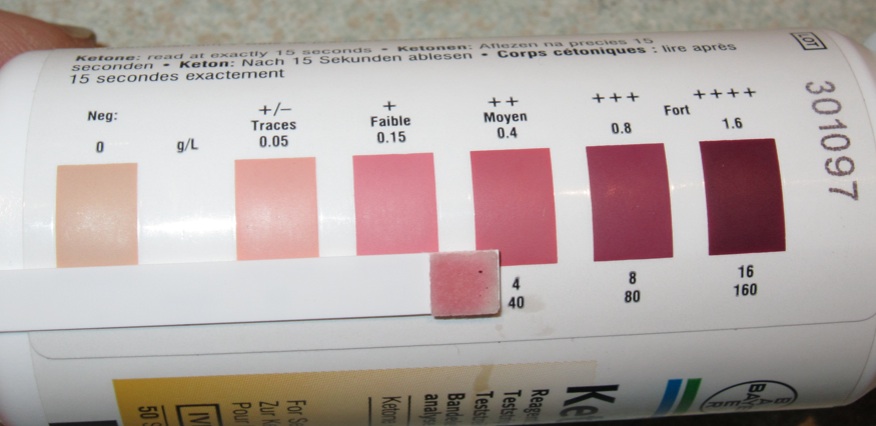Nutritional Ketosis – The Real Goal of Low Carbohydrate High Fat Eating
Until you understand this, I believe, you don’t really understand what low carbohydrate eating is about. You may be skirting around the edges of the idea without really getting to grips with it. The real point is to get your carbohydrate intake low enough so that you preferentially burn fat as a fuel. Otherwise if you keep feeding your body sugar, or things that turn to sugar in your blood, your body will be forced to deal with that by using that as fuel and storing what it can’t use as fat. You can only truly start using fat as fuel when you no longer give it that choice.
The way you can tell if you’ve shifted over from carbohydrate to fat as your fuel source is by measuring the amount of ketone bodies you have floating around. That way there is no uncertainty.
Getting into nutritional ketosis is a simple thing to do. Simple does not equate to easy, as the main issue I see are the various emotional roadblocks that we come up against. Like helplessness, rebellion or addiction to put names to what I see are the main 3. I’ll do a page on this at a later date and I’ll add the link here when I do.
Nutritional ketosis is often mistakenly associated with a potentially fatal condition called Diabetic Ketoacidosis. The difference really is in degree. Probably the best analogy I’ve heard is likening nutritional ketosis to having a shower or a bath. It’s good for us. On the other hand Diabetic ketoacidosis can be a problem for Type 1 Diabetics and is more like a flash flood that can seriously carry you away and can kill you. Type 1 diabetics need to be more careful than the type 2’s or the rest of us. Which is why I recommend learning from Dr Richard Bernstein and listening to Dr Troy Stapleton, both Type 1 Diabetics, who learned how to handle their own blood sugars impeccably.
When you think about it, Nutritional Ketosis was our natural state for thousands of years prior to agriculture. It’s the state our body, brain and mind loves the most and functions best in. From my experience it’s one of those seeing and believing things, until you’ve experienced it yourself it’s hard to believe in it. Once you have experienced it, it’s easy to believe in. It can even be a moment of enlightenment: Oh, this is what it’s like to be alive:) It’s interesting for me that I’m finishing this page off over Easter 2014. For some people ketosis really can feel like they’ve risen from the dead as they’re body & mind switch on in a way they may never have experienced before.
I have often wondered if this is the reason people can feel amazing while fasting. Because they are no longer feeding their bodies carbohydrates and are finally living off fat and protein. It just happens to be their own:) And saturated animal fat at that:)!
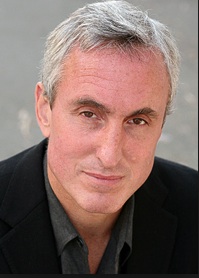 Gary Taubes has a great rewrite on ‘you are what you eat’. He says – the idea is to eat what we are. And when you break us down we are primarily water, minerals, protein and fat.
Gary Taubes has a great rewrite on ‘you are what you eat’. He says – the idea is to eat what we are. And when you break us down we are primarily water, minerals, protein and fat.
Hopefully you now see that we have to let go of all that rubbish of carbohydrates being our main source of energy. Our body is in fact so sensitive to glucose that it keeps it in a very narrow, tightly controlled range. That should give us a clue, shouldn’t it? Too much or too little is very dangerous for us. (remember those ‘healthy’ complex carbohydrates you’ve heard about, are simply a long chain of carbohydrates where the chain is made up of glucose molecules. Much like a pearl necklace is made up of pearls. And our body can rip one of those ‘pearl’ necklaces apart in a nanosecond)
So how much sugar do you think the average person has in 5L of blood? I imagine it’s a lot less than you think. There’s only about 5gms of glucose in our blood at any given time. That’s just 1 teaspoon of sugar total! That’s a big clue, don’t you think, to how much carbohydrate to have? An even bigger clue could be that when we don’t eat any carbs our liver happily creates just the right amount to keep us extremely happy. So, no, carbohydrates are not an essential thing for our energy levels.
When we eat bread, rice, fruit, potatoes etc etc several times a day it’s like throwing sugar grenades at our metabolism. Eating that way sends your body constantly scurrying on a mercy mission to do something with all that sugar! Our pancreas runs into overdrive sending all the insulin soldiers out there to make sure that glucose is stuffed away somewhere safe. But the problem is your body can only take so much before it gets to the point that your ‘cells’ just can’t take anymore because they’re crammed full of ‘sugar prisoners’. Your pancreas knows it has to do something and the only thing it knows to do is to send out more and more insulin soldiers to less and less effect as the cells dig in to defend themselves. That’s called insulin resistance and it keeps on going till all the little insulin factories in your pancreas just get exhausted and one by one shut down shop, never to open again. When you’ve killed off over half your factories, through overworking them, that’s when type 2 diabetes starts to show up. Which is happening to younger and younger people.
But I digress and I’m not going to go down the road of how horrendously ugly a disease diabetes is but if you want some more motivation check out some pics
Hopefully you get the picture.
Should everyone be on a ketogenic diet?
There are a rare few exceptions as shown in this slide from Dr Zeeshan Arain’s video. Zeeshan is an Australian GP and Sports Medicine doc.
If you can say yes to anything in the YES column then you definitely will benefit from a ketogenic diet. If you’ve got the issues in the PROBABLY column then it’s very likely that you will see some benefit. Although if you listen to Dr Michael Fox I’m sure you’ll get that he would put PCOS in the YES column. PCOS is PolyCystic Ovarian Syndrome, one of the major causes of infertility.
People who shouldn’t go on a ketogenic diet have various metabolic deficiencies that you’ll see in the NO column. I have a friend & colleague who has acute intermittent porphyria who has found Body Balance to be extremely helpful.
How low do you have to go?
So now that you’ve hopefully decided to try this out, the question is how low do you have to go with your carbohydrate intake to get into ketosis?
That depends on a few things. Your genes, your age, how much exercise you get and how much you’ve already damaged your metabolism with decades of high carbohydrate eating. Sorry to burst your bubble with that last comment. I know you thought you were eating normally and healthily but really you’ve been on a high carbohydrate fad diet. I know it hurts to hear that. All sorts of feelings arise that you’ll need to deal with but however low you have to go, the main point for all of us is to get to the point where we can happily accept that’s our number and learn to eat accordingly.
Here’s a slide from Dr Jeff Volek‘s presentation. Where he says that to go into ketosis an elite athlete may be aiming at 70gms of CHO (Carbohydrate) a day. That’s an elite athlete folks not Joe and Joanne Blogg’s. As Jeff says below <50gms a day will do for most people. Although I believe it was Jeff’s colleague Dr Eric Westman who said that for most people getting under 20gms a day is a good failsafe starting point.
So how do you know when you are in ketosis?
The nice thing about this is you can measure it:). You can do that by testing your urine, your blood or your breath. The easiest and cheapest way to do this for most people are urine test sticks. In NZ you can buy Bayer Ketostix (100 for under $20) at your local pharmacy. You may only have to buy 1 or 2 lots as you’ll get to know in those 3 to 6 months what you need to do to get into ketosis. Best time to do them is first thing in the morning. Get a mid stream urine from that first pee. If that’s too gross a thought for you go for the pin prick blood test. If that’s too painful a process there are some breath testers out there.
In terms of the target above I’m tending more towards the insulin resistant group. Which makes sense as when I don’t restrict my carbs my blood fats go the wrong way, which is one of the indicators of metabolic syndrome. Here’s what mine looks like when my daily intake of carbs is in the 30-40+ gms a day range. You can see there are only traces of ketones present.
Weight and fat loss can happen before you get your carbohydrates down into ketosis but there is a sweetspot where that hums along the best. Most people’s sweetspot is between 1-4mmol/l. I need to get below 20-30gms a day to achieve this. And it certainly feels like a sweetspot:).
Pitfalls
Time to adapt
It can take a couple of weeks for your body to adapt to burning fats rather than carbs. So don’t start this programme a couple of weeks out from a big event. You can go through carb withdrawal. Headaches, dizziness, weakness and fatigue are the most common symptoms. Not everyone does this. I didn’t. The longer you stay ketoadapted the easier it is to bounce back from days that you drop out of ketosis.
Salt
At one point I noticed I was feeling more tired than usual and wondered why. Then I fortunately read this piece of information:
A low carb diet is naturally diuretic, which flushes sodium and water from your body. Fatigue, light-headedness upon standing up or with exposure to heat (in a hot shower or hot bath or while mowing the lawn os a hot day, for example), weakness, constipation, chronic headaches and leg cramps are all signs you might not be getting enough sodium. Like fat, salt has been unjustly demonised, despite being essential to life and well-being.
The solution is either consume: 2 cups of broth, 1/2 teaspoon of salt of 2 tablespoons of soya sauce daily from your first day… continue until your carb contintake exceeds 50gms of Net Carbs. A New Atkins For A New You, Westman, Phinney & Volek.
My energy levels bounced back and now when I get tired I pay more attention to my salt intake. I love the amazing difference simple things can make:).
The whole low salt thing we’ve been hit with, that came along with the high carb low fat recommendation, is an issue if you eat lots of carbs, Because carbs make us retain water which in turn bumps up our blood pressure. That was the reason Dr Steve Phinney decided to go low carb.
Too Much Protein
Protein also elevates blood insulin. Not as much as carbohydrates do but enough to make a difference. Generally a palm sized piece of protein 3 times a day is enough. If you’ve seriously got your carbohydrates below 20gms of net carbs and you aren’t getting into ketosis you’ll want to look at your protein intake.
The only energy based nutrient that has no impact on insulin is fat. So that’s what you need to replace the carbs and possibly some protein that you’ve taken out of your diet, with.
Related Pages
You’ll see more about the WHY and more importantly about the HOW, along with some examples of WHAT to eat for breakfast, lunch, dinner and snacks, if you need them, on this page. In there you’ll find my frae book and video course that will explain everything:
To add more weight to that you’ll find the same message coming through from a variety of doctor’s here. There’s nothing like repetition when you want to get to grips with a new skill and eating for wellbeing and performance is just that, an acquired skill. Learn from the best out there on this page:
http://daragrennie.com/health/low-carb-high-fat-how-many-doctors-will-it-take
Can I be of some help?
It took me a while to get all this together for myself. I’d love to help you shorten your learning curve:) Check out my 1-on-1 Page.

